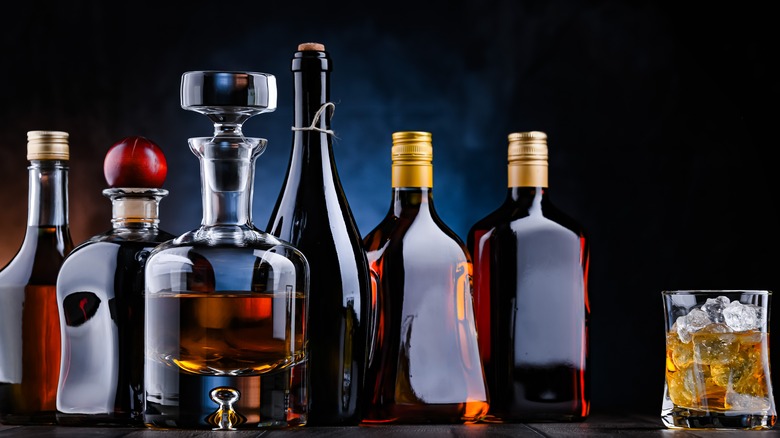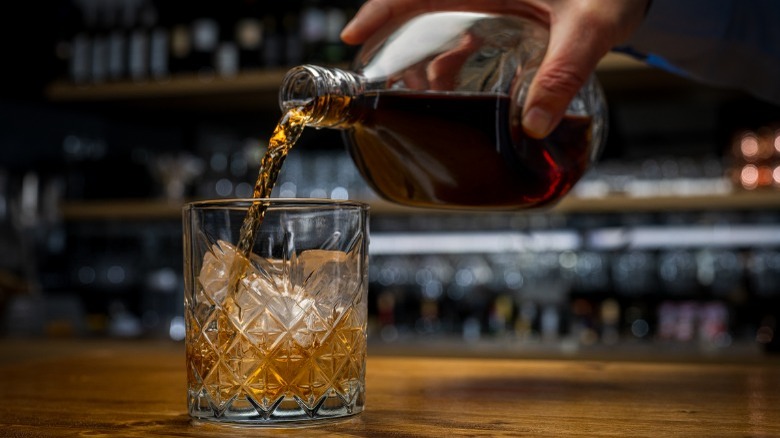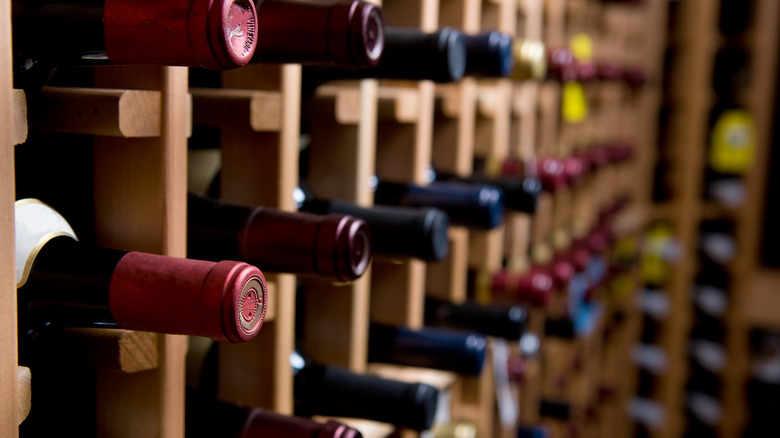Sorry, But Liquor Actually Does Expire
If you've hopped on the bar cart trend like so many others have, your cart is probably filled to the brim with all sorts of liquors and fun-flavored liqueurs. What they don't tell you about stocking your bar cart is that the liquor on it doesn't last forever. We hate to be the ones to break it to you, but liquor, just like the milk or juice in your fridge, actually does expire.
There are a number of factors that impact the shelf life of alcohol including temperature, light, and oxidation. Liquors like gin, vodka, and tequila are considered shelf stable, which means that they can last a really long time on your shelves when unopened — pretty much forever, actually, if stored well. Once opened, liquor should be consumed within eight months for optimal taste. Sweet liqueurs or cordials like amaretto or trendy Aperol, on the other hand, should be consumed within six months of opening. But, unless you're a professional liquor taster, you may not even notice that there's been a major change in your liquor's flavor until much after these cut-offs. Even so, for the truly best experience, try to use your opened liquors within their expiry limits.
The science behind why liquor lasts
Like any other food or drink, making liquor last all comes down to science. The reason that liquor stays safe for months after opening comes down to its high alcohol content, which prevents any harmful bacteria or microorganisms from growing because alcohol is classified as a preservative. Even liqueurs like Baileys that contain dairy have a high enough alcohol content to prevent any harmful bacteria from accumulating — while a typical gallon of milk needs to be thrown out after about a week.
Generally, once they're opened, liquors with an alcohol content above 15% can be stored upright with their caps on. Liqueurs, on the other hand, need to be stored in a fridge because of their lower alcohol content and the fact that they're flavored. Keep in mind that some liqueurs might become cloudy due to their oil content because of the decreased temperature.
If you're looking to maintain the integrity of your liquors, there are extra steps you can take. When storing whiskey, for example, to treat it like a true connoisseur, keep it upright, in a cool, dark place. Exposure to sunlight and oxygen can impact the taste and color. So even if you don't have a cellar, following these storage principles to the best of your ability will ensure your whiskey keeps. These rules don't just apply to whiskey — what works for whiskey should generally work for all spirits, which includes vodka, tequila, and gin as well.
What about beer or wine?
So liquor expires, but what about beer or wine? Much like liquor, unopened beer is shelf-stable and will last up to eight months past the "use by" date. Beer with a higher alcohol content will last longer than beer with a lower alcohol content. Where beer differs from liquor is that it should be consumed within a few hours of opening. Beer is carbonated, so it'll eventually lose all of that fizzy goodness.
You may have heard that all wines get better with age, but this isn't necessarily the case. While fine, expensive wines may get better, cheaper wines should probably be drunk within two years after purchase. Once any wine is opened, it ages faster. You should drink your wine within a week and be sure to store it corked and in the fridge. Like beer, carbonated wine has a short lifespan, and should be consumed within three days.
If you're planning on keeping your wine corked, there are ways to store it that'll extend its shelf life. Like liquor, wine is sensitive to light and temperature, so store it in a cool and dark room. Wines should also be laid on their side to keep the cork moist. If the cork dries out, you risk contaminating the wine with too much oxygen. All of these factors are why wine is typically stored in wine cellars where the temperature, moisture levels, and amount of light can be controlled.



